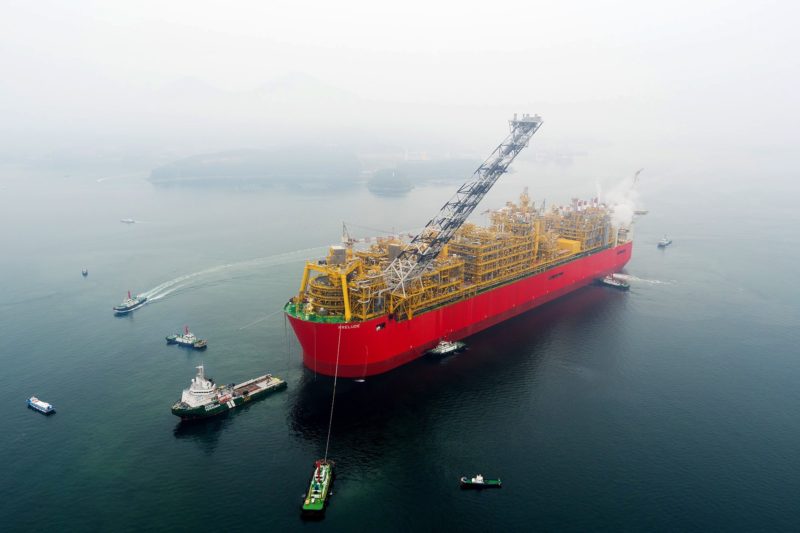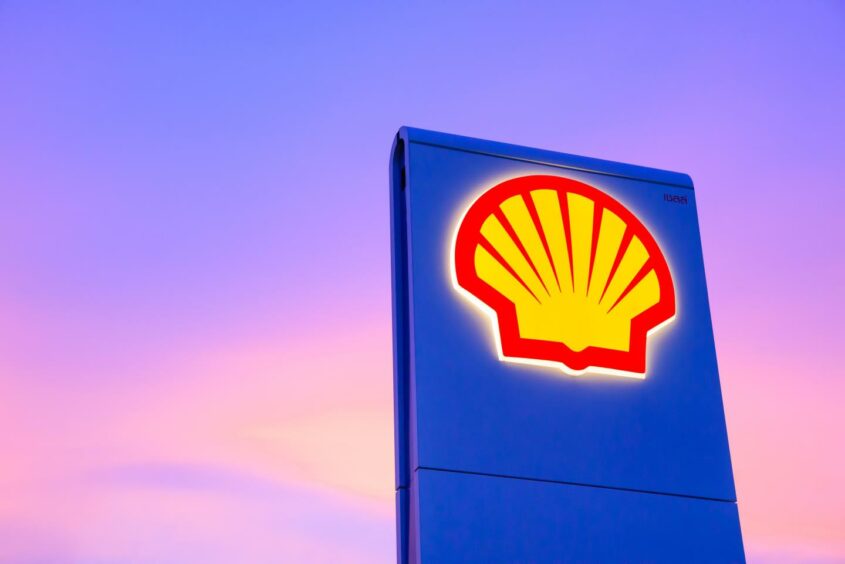The Australian offshore regulator NOPSEMA has ordered Shell (LSE:RDSA) to stop production at its Prelude floating liquefied natural gas (FLNG) unit until the energy major can demonstrate the giant floater’s ability to recover power and services safely.
By Damon Evans
28/12/2021,

Pictured is Shell's Prelude, the world's largest floating LNG project
The Australian offshore regulator NOPSEMA has ordered Shell (LSE:RDSA) to stop production at its Prelude floating liquefied natural gas (FLNG) unit until the energy major can demonstrate the giant floater’s ability to recover power and services safely.
In early December, Shell temporarily suspended liquefied natural gas (LNG) production at Prelude FLNG due to a fire onboard the facility following a power outage.
Repeated attempts to establish stable electricity supply at the FLNG unit was jeopardising the health and safety of staff onboard. “The failure to restore reliable power was seen to represent an ongoing impact and risk to the health and safety of the personnel on the facility,” said NOPSEMA.
LNG production at Prelude offshore Western Australia could remain shut for months.
The 488 metre long Prelude, the world’s biggest FLNG unit, has been beset with problems since it shipped its first cargo of LNG in June 2019. Prelude was shut down in February 2020 for nearly a year after a reported electrical problem. The floater had previously suffered two incidents that saw the unintended release of gas, which NOPSEMA described as “dangerous”. Shell restarted production in January 2021 and it steadily produced LNG over 2021.
Shell operates Prelude FLNG with a 67.5% interest. Its partners include INPEX (17.5%), CPC (5%), and KOGAS (10%)
The FLNG facility can produce at least 5.3 million tonnes per annum (mtpa) of liquids: 3.6 mtpa of LNG, 1.3 mtpa of condensate and 0.4 mtpa of liquefied petroleum gas.
The Australian offshore regulator NOPSEMA has ordered Shell (LSE:RDSA) to stop production at its Prelude floating liquefied natural gas (FLNG) unit until the energy major can demonstrate the giant floater’s ability to recover power and services safely.
In early December, Shell temporarily suspended liquefied natural gas (LNG) production at Prelude FLNG due to a fire onboard the facility following a power outage.
Repeated attempts to establish stable electricity supply at the FLNG unit was jeopardising the health and safety of staff onboard. “The failure to restore reliable power was seen to represent an ongoing impact and risk to the health and safety of the personnel on the facility,” said NOPSEMA.
LNG production at Prelude offshore Western Australia could remain shut for months.
The 488 metre long Prelude, the world’s biggest FLNG unit, has been beset with problems since it shipped its first cargo of LNG in June 2019. Prelude was shut down in February 2020 for nearly a year after a reported electrical problem. The floater had previously suffered two incidents that saw the unintended release of gas, which NOPSEMA described as “dangerous”. Shell restarted production in January 2021 and it steadily produced LNG over 2021.
Shell operates Prelude FLNG with a 67.5% interest. Its partners include INPEX (17.5%), CPC (5%), and KOGAS (10%)
The FLNG facility can produce at least 5.3 million tonnes per annum (mtpa) of liquids: 3.6 mtpa of LNG, 1.3 mtpa of condensate and 0.4 mtpa of liquefied petroleum gas.
Shell waiting on approval for CCS to exit Abadi LNG
Shell’s (LSE:RDSA) attempt to divest its stake in the Abadi liquefied natural gas (LNG) project, proposed in the Masela Block offshore Indonesia, is likely to be further delayed as operator Inpex (TYO:1605) seeks approval for a revised plan of development (POD).
By Damon Evans
28/12/2021,
Shell’s (LSE:RDSA) attempt to divest its stake in the Abadi liquefied natural gas (LNG) project, proposed in the Masela Block offshore Indonesia, is likely to be further delayed as operator Inpex (TYO:1605) seeks approval for a revised plan of development (POD).
By Damon Evans
28/12/2021,

Chachoengsao, Thailand - Jan 28, 2018: Shell gas station logo with blue sky background during sunset. Shell is seeking to divest its share of Masela in Indonesia.
Register here for the Energy Voice daily newsletter, bringing you key news and insight from across the global energy landscape.
Sign Up
Shell’s (LSE:RDSA) attempt to divest its stake in the Abadi liquefied natural gas (LNG) project, proposed in the Masela Block offshore Indonesia, is likely to be further delayed as operator Inpex (TYO:1605) seeks approval for a revised plan of development (POD).
The revised plan of development is required as Inpex want to make revisions to the proposed LNG project, including adding carbon capture, utilisation and storage (CCUS) technology amid increasing global pressure to cut emissions, said deputy chairman of upstream regulator SKK Migas, Fatar Yani Abdurrahman.
“Shell can only divest (its participating interest in Masela) if the POD has been revised by including CCUS. We’re still studying that. Otherwise, it will be difficult (for Shell) to sell (the shares), because (the gas) will not be considered as green product,” he told dunia-energi.com recently.
However, it remains to be seen if adding carbon capture and storage (CCS) or CCUS to the proposed project will help Shell’s divestment process.
Shell has so far failed to generate any significant interest in the sales process for its share of the giant Abadi LNG project 18 months after the Indonesian government announced the Anglo-Dutch supermajor’s intention to divest.
Shell’s 35% stake in the Masela Block offshore Indonesia is valued at $800 million to $1 billion, according to analysts. But, despite the block’s proximity to Asian demand markets, it is proving tough to find buyers for one of the world’s largest undeveloped gas resources. Japan’s Inpex operates the project with the remaining 65% share.
Development of Abadi’s proposed 9.5 million tonne per year (mtpy) onshore liquefaction scheme will be technically, as well as commercially challenging, and is expected to cost around $18 billion to $20 billion. The project includes a large FPSO unit capable of handling 51 million cm per day of gas and up to 36,000 barrels per day of condensate, as well as a deep-water trunk pipeline from the Abadi field to proposed liquefaction facilities on Yamdena in the remote Tanimbar Islands.
The Abadi field is carbon dioxide (CO2) heavy. Adding CCS or CCUS will likely make the project even less commercially appealing. But the growing push towards decarbonisation, especially among Japanese companies, makes development of Abadi almost impossible without CCS.
Inpex and Shell’s Abadi faces more headwinds as US LNG muscles in
Inpex said in August that it does not plan to take a final investment decision until around 2024-2025, two years later than previous guidance of 2022-2023. This is the latest in a series of delays for Abadi. Inpex blamed the delay on the COVID pandemic, which has disrupted site survey work ahead of front-end engineering and design (FEED). Inpex also said the project may need to be redesigned to incorporate carbon capture and storage (CCS) or carbon capture utilisation and storage (CCUS).
Register here for the Energy Voice daily newsletter, bringing you key news and insight from across the global energy landscape.
Sign Up
Shell’s (LSE:RDSA) attempt to divest its stake in the Abadi liquefied natural gas (LNG) project, proposed in the Masela Block offshore Indonesia, is likely to be further delayed as operator Inpex (TYO:1605) seeks approval for a revised plan of development (POD).
The revised plan of development is required as Inpex want to make revisions to the proposed LNG project, including adding carbon capture, utilisation and storage (CCUS) technology amid increasing global pressure to cut emissions, said deputy chairman of upstream regulator SKK Migas, Fatar Yani Abdurrahman.
“Shell can only divest (its participating interest in Masela) if the POD has been revised by including CCUS. We’re still studying that. Otherwise, it will be difficult (for Shell) to sell (the shares), because (the gas) will not be considered as green product,” he told dunia-energi.com recently.
However, it remains to be seen if adding carbon capture and storage (CCS) or CCUS to the proposed project will help Shell’s divestment process.
Shell has so far failed to generate any significant interest in the sales process for its share of the giant Abadi LNG project 18 months after the Indonesian government announced the Anglo-Dutch supermajor’s intention to divest.
Shell’s 35% stake in the Masela Block offshore Indonesia is valued at $800 million to $1 billion, according to analysts. But, despite the block’s proximity to Asian demand markets, it is proving tough to find buyers for one of the world’s largest undeveloped gas resources. Japan’s Inpex operates the project with the remaining 65% share.
Development of Abadi’s proposed 9.5 million tonne per year (mtpy) onshore liquefaction scheme will be technically, as well as commercially challenging, and is expected to cost around $18 billion to $20 billion. The project includes a large FPSO unit capable of handling 51 million cm per day of gas and up to 36,000 barrels per day of condensate, as well as a deep-water trunk pipeline from the Abadi field to proposed liquefaction facilities on Yamdena in the remote Tanimbar Islands.
The Abadi field is carbon dioxide (CO2) heavy. Adding CCS or CCUS will likely make the project even less commercially appealing. But the growing push towards decarbonisation, especially among Japanese companies, makes development of Abadi almost impossible without CCS.
Inpex and Shell’s Abadi faces more headwinds as US LNG muscles in
Inpex said in August that it does not plan to take a final investment decision until around 2024-2025, two years later than previous guidance of 2022-2023. This is the latest in a series of delays for Abadi. Inpex blamed the delay on the COVID pandemic, which has disrupted site survey work ahead of front-end engineering and design (FEED). Inpex also said the project may need to be redesigned to incorporate carbon capture and storage (CCS) or carbon capture utilisation and storage (CCUS).
No comments:
Post a Comment